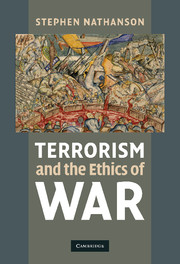Book contents
- Frontmatter
- Contents
- Acknowledgments
- Introduction
- PART I TERRORISM: WHAT'S IN A NAME?
- 1 The problem of defining terrorism
- 2 Defining terrorism
- 3 What makes terrorism wrong?
- 4 Innocence and discrimination
- 5 “Who dun it” definitions of terrorism
- Conclusion: taking stock
- PART II WHY MORAL CONDEMNATIONS OF TERRORISM LACK CREDIBILITY
- PART III DEFENDING NONCOMBATANT IMMUNITY
- PART IV HOW MUCH IMMUNITY SHOULD NONCOMBATANTS HAVE?
- Conclusion: terrorism and the ethics of war
- Bibliography
- Index
Conclusion: taking stock
Published online by Cambridge University Press: 05 June 2012
- Frontmatter
- Contents
- Acknowledgments
- Introduction
- PART I TERRORISM: WHAT'S IN A NAME?
- 1 The problem of defining terrorism
- 2 Defining terrorism
- 3 What makes terrorism wrong?
- 4 Innocence and discrimination
- 5 “Who dun it” definitions of terrorism
- Conclusion: taking stock
- PART II WHY MORAL CONDEMNATIONS OF TERRORISM LACK CREDIBILITY
- PART III DEFENDING NONCOMBATANT IMMUNITY
- PART IV HOW MUCH IMMUNITY SHOULD NONCOMBATANTS HAVE?
- Conclusion: terrorism and the ethics of war
- Bibliography
- Index
Summary
I have spent a lot of time (yours and mine) trying to clarify the word “terrorism.” This is important to do because confusions about what “terrorism” means make it impossible to think clearly about it. “What is terrorism?” was the first question on my agenda at the start of this book. I have now answered this question with a definition. The definition leads to an answer to the second question: what is it that makes terrorism especially wrong? When we examine the features of terrorist acts, the one that most plausibly explains why terrorism is especially wrong is that it intentionally kills and injures innocent people.
I have also partly answered the third question: If terrorism is so obviously wrong, why do moral condemnations of terrorism often lack credibility? These condemnations often lack credibility because they rely on biased definitions of terrorism. As a result, actions that are labeled as “terrorism” when carried out by some people escape the “terrorist” label when carried out by others.
The answer to question 3 provides a partial answer to question 4: What requirements must be met in order to make condemnations of terrorism morally credible? The first requirement is that the labeling of acts as terrorism must be unbiased and impartial. A second requirement is that moral condemnations of terrorism must be based on credible moral principles that are applied in an unbiased, impartial way.
- Type
- Chapter
- Information
- Terrorism and the Ethics of War , pp. 73 - 74Publisher: Cambridge University PressPrint publication year: 2010



